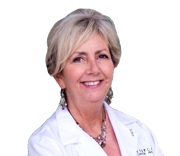Building “new” offers opportunities to re-envision. Re-envisioning cancer care with the patient at the center is Dr. Gail Eckhardt’s mission as the inaugural director of the LIVESTRONG Cancer Institutes at the Dell Medical School at the University of Texas at Austin.
“We really want to envision the clinical care system as something where a patient can receive all of their care,” she says, “instead of referring someone all over the planet for what they need. So often, we focus on the medical components rather than the other things that the patient needs.”
Read More
Building “new” offers opportunities to re-envision. Re-envisioning cancer care with the patient at the center is Dr. Gail Eckhardt’s mission as the inaugural director of the LIVESTRONG Cancer Institutes at the Dell Medical School at the University of Texas at Austin.
“We really want to envision the clinical care system as something where a patient can receive all of their care,” she says, “instead of referring someone all over the planet for what they need. So often, we focus on the medical components rather than the other things that the patient needs.”
Dr. Eckhardt was recruited from the University of Colorado, School of Medicine, Anschutz Medical Campus in Aurora, where she served as associate director of translational research at the University of Colorado’s Comprehensive Cancer Center. Her position at Dell was made possible with the help of a Recruitment of Established Investigators Award from CPRIT. A physician-scientist, she is internationally recognized as a leader in collaborative preclinical and early clinical translational cancer research.
The newly created Dell Medical School opened its doors in 2016. The LIVESTRONG Foundation gave $50 million to establish a cancer care center and research facility at the medical school.
“Our overall vision is to develop a novel, patient-centered cancer institute that really encompasses all components of care and research,” Dr. Eckhardt says.
One example of how the Cancer Institutes are rethinking the paradigm of cancer care is a partnership with the school of social work to assess not only how patients are doing in terms of their treatment but also how they are feeling and functioning in their lives. Dr. Eckhardt is also meeting with campus and community leaders to look for ways to make cancer care more accessible to people who are traditionally underserved or financially challenged.
Dr. Eckhardt says one of the gaps in cancer care in Austin is early clinical trials of new therapies. Currently, clinical trials in Austin mainly focus on Phase II and III trials—which are later studies of efficacy. “Increasingly we’re getting better at finding more effective drugs to treat cancer,” she says, “but we’re discovering them early, and often that discovery is made in Phase I.” Bringing these clinical trials of novel therapies to Austin will really add value to the community, she says.
She hopes her own expertise in research with mouse models of tumors derived from patients will help close the gap that often exists between scientific research and patient care. “We want to explore how to take the best ideas from the bench to the clinic,” she says. She’s hired a translational research manager to build a bridge between laboratory researchers and clinicians.
Dr. Eckhardt is excited to be in an environment where she can build new programs. “The creation of Dell Medical School and LIVESTRONG Cancer Institutes, and the money from CPRIT, created a perfect environment for me to come back to Texas,” she says.
Born and raised in Houston, Dr. Eckhardt received her undergraduate degree from Stephen F. Austin State University and her M.D. from the University of Texas Medical Branch in Galveston. Before moving to Colorado, she served as associate director for clinical research at the Cancer Therapy and Research Center, Institute for Drug Development, in San Antonio.
Read Less

